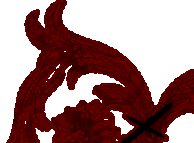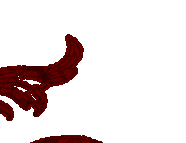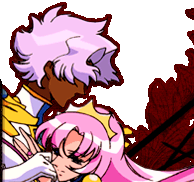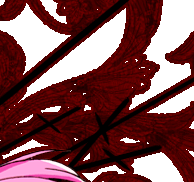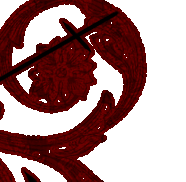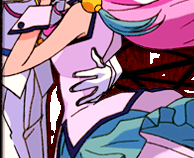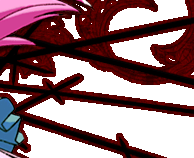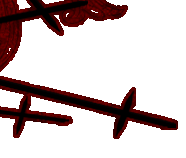

Anthy's brother takes great delight in tormenting the masses. When looking at the bright light that is Akio's malice for the world, you tend to miss the dimmer light of Anthy's resentment. Anthy is just as qualified to hate the world as Akio, but obviously takes out her aggression in a wildly different manner.
Several events
in the series clue you in to this behavior. These events can sometimes
be hard to spot though, because Anthy is a passive aggressive personality.
Such people tend to prefer covert means of personal revenge that oftentimes,
don't even lead back to them. Passive aggressive people don't feel
it necessary that the victim know who the aggressor was; they are
happy to see the victim suffer, whether that victim knows who caused
their strife or not. One of Anthy's more memorable moments in relation
to this is right in the first episode.
Saionji: It can't be...I've... lost?
Saionji: Anthy...
Anthy: Take it easy, Saionji... sempai. A great deal
of pride and emotional investment went into his being engaged to the
Rose Bride; Saionji both loved her and desired her as a trophy. In
the moment of his defeat, Anthy couldn't possibly have said anything
more cutting, because in and of itself, she's said nothing wrong.
She's doing exactly what she's supposed to do when her victor changes,
and that's what hurts him. He's supposed to be special to her. Saionji
has convinced himself there is a love between them that's special,
and that doesn't answer to the rules of the rose seal. But here, in
his humiliating defeat, he finds he's just another duelist. This is
one of the most obvious moves Anthy makes, because not only can you
tell by her tone of voice, but you're shown the first instance of
a faint victory smile that you will see again later on. Another event from the first arc is in episode 7 ("Juri's Unfulfillment"), where she innocently offers Juri an orange flower, an action Juri relates to Shiori in memory. This instantly evokes hostile action from Juri; a clear sign that the attempt to hurt her was successful. After all, that was the point. Anthy picked at the wound that would drive Juri to duel later in the episode.
It could also
be said that in doing this Anthy is attempting to create a link in
Juri's mind between herself and Shiori, which would be quite useful
in getting Juri to duel. While that does make sense, I don't believe
this was the intention or the outcome. Juri doesn't see the Rose Bride
as 'cruelly innocent' at all. In fact, Juri seems to dislike Anthy
quite a bit. Juri sees her as manipulative, passive, cruel, and an
overall shady character. Most of that applies to Shiori as well, but
Juri sees her as being innocent in her actions, where Anthy is quite
obviously calculating, deliberate, and light years away from innocent.
Instead, Juri connects Utena to Shiori later on in the Black Rose
arc. One of the less obvious of Anthy's targets is Nanami. This one could be argued, because there's nothing really tying it together except secondary evidence, the brunt of which is Nanami's constant barrage of attacks from animals, and its contrast to Anthy's fondness for them. From there, one could deduce that Nanami's trouble with animals comes at the hands of Anthy, who torments her from afar.
The most direct support of this is in episode 16 ("Cowbell of Happiness"). In this episode, Anthy knits a red sweater that incites Nanami to transform fully into a cow. In Revolutionary Girl Utena, there's very little coincidence, and there's certainly none here; Utena comments on how strange it is that Anthy would knit a sweater at that time of year (assumingly, spring or summer).
And of course, what essay of mine would be complete without bringing Akio into it?
Akio: I just found a comet. A new star that no one knows about
yet.
Akio: But I won't tell anybody... ...or give it a name. Strange, isn't
it?
Akio: I feel like when I discover a new star I make it mine.
Akio: But a star is a star. It belongs to nobody.
Anthy: Good night, brother.
Akio: Do you still torment me? The power of this sequence is more in the visuals than the words; Anthy is quietly dressing while Akio talks, and you're shown a slight grin on her face after the conversation. The same grin she uses against Saionji in the first episode, which I did say you'd be seeing again. (Akio is, by the way, the aggressor here. He's going way out of his way to pound into Anthy's head that Utena is *his* conquest. A fact that, by this point in the series, leaves a sour taste in her mouth. Anthy is fighting back.)
Anthy's weapon
here is indifference. She's giving him the same blank, passive attitude
she gives everyone else. This has a profound effect on Akio, who of
all people, should be able to (in fact, HAS to) reach beyond that
shell to Anthy. Have I mentioned that they obviously just finished
having sex? Anthy's behavior here insinuates that what they just did
meant nothing to her. She wasn't participating in the power struggle,
she wasn't in a mad rush to get off—nothing. She goes to him, has
sex with him, and then leaves like it was a duty she had to fulfill.
Her lack of anything resembling a response to Akio is catastrophic,
and that they just finished the deed makes the insult even worse.
Up until this point, her attachment to him has been his lifeline,
and the string that keeps her in Ohtori suffering for him. And now,
in this moment, she makes plain her growing irritation with and hatred
of her brother, and the possibility that she may grow tired enough
to leave. Though I meant
to specifically point out things she does during the show, you can't
really ignore the worst thing Anthy does. She takes Dios from the
people who needed him. It's evident why she does this: Dios's driven
to near—death, and would kill himself for these people. She 'saves'
Dios, but it's just as much an act of hostility. While it's obvious
she's lashing out at the people who would let him die, she's also
punishing Dios. His lack of concern for his own wellbeing hurts Anthy,
who loves him, more than it hurts himself. She had to have been at
least a little aggravated about that. So what does she do? She kills
two birds with one stone—she takes the savior from those who need
him, and she takes Dios away from the people he compulsively serves. So why all the hate? First, there's the obvious. The masses hurt her, and she's hurting them back. They continue to pain her even now as the swords stab her at their will, and to soothe that pain even in the slightest, it becomes necessary to lash out at them in return. Though Anthy is the witch, and because of it does have resources of her own, she certainly wields no million swords of hate; this isn't about defeating a force she knows she can't overcome. This is about lashing out (even with her limited capabilities) at the masses. Just to soothe the pain, and sour their victory. ("You never got me down, Ray…")
However, there's more to it than that. While Akio is her primary tie to Ohtori, her malice and hatred for the world binds her there as well. She trusts and loves no one. Tiring of Akio's abuse gave her a reason to leave Ohtori, but it took trust and love to show her how to do it. For many people, the hardest challenge in their lives is finding the will to put their heart in another's hands, friend or otherwise. Many people detach themselves from society in an effort to keep their hearts from being broken, not realizing that doing so also robs them of the chance to love. A heart that doesn't put itself at risk will not be hurt, but it will not be healed either. This is Anthy.
In her defense, this is not an outlandish philosophy for her to have. Anthy has loved before. She loved Dios, and still does. We all know what she got out of that; no small wonder that she'd find trusting and loving others to be a hazardous affair.
This detachment
from society, and deeply rooted hatred of it, has over time spawned
a whole new monster. By the beginning of Revolutionary Girl Utena, Anthy has been in her
coffin for so long that she has come to enjoy it. (Albeit, for a totally
different reason than Akio. That's a whole other essay.) Individuals
faced with public disapproval and hatred will often find themselves
building about them a wall of (usually false) superiority. This wall,
above all, shields Anthy's ego. Instead of hating herself for being
different, for being a lesser being, and for being victimized, she
turns hatred of herself around to hatred of the people. With this
wall, Anthy has made for herself a measure of pride in being different,
a lesser being, and most of all, for being victimized. To a degree,
her sense of superiority is well placed. It's accepted fact that people
will lash out at what they don't understand. In the flashback, it
did seem as though the people were afraid of Anthy. Afraid of what
she'd done, and what she might do. The victim of this kind of hatred
will eventually realize that they are hated because they are feared.
(This understanding of human nature usually comes with old age and
long—term observation, which are probably the greatest weapons she
and her brother wield.) Once you understand that you're feared, it's
not a vast leap to turn the fear others have of you into a point of
pride. Anthy is so above and beyond these people that they feel they
have no choice but to retaliate. This wall becomes a coping mechanism
for the pains she must suffer everyday at their hands. So much suffering,
because they're really, deep down, just afraid. This holds her to Ohtori, because it's a negative emotion that's so much a part of who she is that her entire view of the world had to change before she could shed it. Her pride in her pain probably came to her over time, but that doesn't lessen its staying power over the course of the series. She takes a million swords and hates it, but nevertheless she's taunting them.
"Is that the best you can do?"
 |

